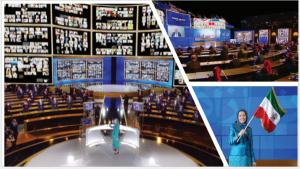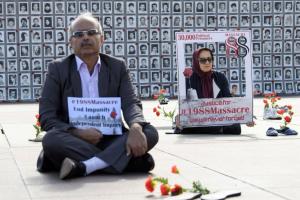(Video)More Than Ever, Confronting Iran’s Regime Is Both a Strategic and a Moral Imperative
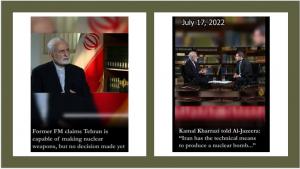
On Sunday, a former Iranian foreign minister and current advisor to the regime’s top leadership, Kamal Kharrazi, told Al Jazeera that the Iranian regime already has the technical capability to build a nuclear weapon, but no decision made yet.
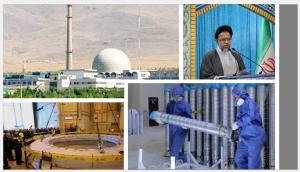
Iran regime’s former intelligence minister, Mahmoud Alavi, very nearly admitted to that strategy early last year when he highlighted a fatwa from acquiring nuclear weapons, but the order could be nullified instantaneously and without consequence.
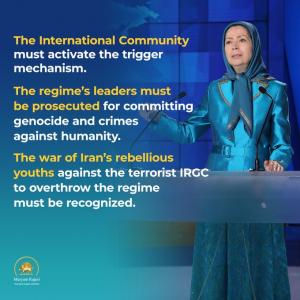
In previous summits, the President-elect of the NCRI, Maryam Rajavi, has highlighted the impact of uprisings and the ongoing expansion in activities by pro-democracy “Resistance Units."
The National Council of Resistance of Iran has long argued that the clerical regime will never give up its ambitions regarding nuclear weapons.
Kharrazi went on to say that the regime has not made the decision to actively pursue that aim, but such statements are rather clearly designed to promote a narrative of peaceful nuclear development which would allow the regime to one day claim that Western adversaries had “forced” it to direct prior advancements toward military ends.
Iran regime’s former intelligence minister, Mahmoud Alavi, very nearly admitted to that strategy early last year when he highlighted a fatwa that supposedly bars the country from acquiring nuclear weapons, but then immediately acknowledged that the order could be nullified instantaneously and without consequence.
“The fatwa forbids the production of nuclear weapons, but if they push Iran in those directions,” Alavi said of the US and Europe, “it is not Iran’s fault. Those who pushed Iran in that direction will be to blame.”
The National Council of Resistance of Iran has long argued that the clerical regime will never give up its ambitions regarding nuclear weapons.
According to the NCRI, this and other provocative gestures toward the international community constitute one of two central pillars of the regime’s strategy for maintaining power.
The other is the domestic suppression of dissent, and both phenomena have been noticeably accelerating in recent years.
The suppression of dissent has clearly become more vital than ever for the regime’s survival since Iran has undergone at least nine anti-government uprisings since the end of 2017.
This has led many analysts to conclude that the regime is in its most vulnerable situation to date.
Although 1,500 peaceful protesters were killed in just several days during an uprising in November 2019, demonstrations resumed across much of the country just two months later, signaling that the repressive strategies are failing.
Under these circumstances, the Resistance and its supporters have promoted the further conclusion that if only pressure were applied to the other pillar of the regime’s survival, then its collapse would follow close behind. Kharrazi’s implicit threat of an imminent nuclear “breakout” should strongly underscore the value of pursuing that collapse.
Some Western policymakers and scholars of international affairs have been making the case for years that the declared goal of American and European policies toward Iran should be regime change.
The National Council of Resistance of Iran (NCRI), meanwhile, has argued that this outcome is the only pathway to a real solution to any number of issues that have proliferated since the mullahs seized power in 1979.
The regime’s nuclear provocations are, of course, one such issue.
But just as significant is the regime’s widely recognized status as the world’s foremost state sponsor of terrorism, and its long history of human rights abuses and crimes against humanity, which continue apace in spite of their underlying failure.
In the first half of 2022 alone, Iranian authorities carried out more than 250 executions, with June boasting the highest monthly total in at least five years. This does not count those who may have died as a result of mistreatment and medical neglect while serving lengthy prison sentences.
There is no shortage of such sentences that are politically motivated in Iran, but this trend has also accelerated in recent years, and on July 11 alone, authorities arrested no fewer than eight people whose only crime was demanding accountability for their loved ones’ deaths during the November 2019 crackdown.
Iran’s latest nuclear provocations are clear indicators of the strategic value that Western nations could derive from confronting the Iranian regime in a more serious way than they have been doing.
Meanwhile, the escalation of human rights abuses inside Iran makes it clear that a more assertive posture toward that regime is also a moral imperative.
And both these phenomena speak to an expectation of impunity that has developed in Tehran after many years of dealings with overwhelmingly conciliatory Western leadership.
The moral imperative to confront Iran’s human rights abuses has always been clear.
Yet no one was ever held accountable for it until just last week, when a court in Stockholm Sweden handed down a life sentence for the former Iranian prison official Hamid Noury, after prosecuting him on the basis of “universal jurisdiction” over serious violations of international law.
The conclusion of that case threatens to bring an end to the era of Tehran’s impunity and to further shake both pillars of the mullahs’ hold on power.
But other Western nations and the international community as a whole must follow up on Sweden’s pioneering decision.
This may entail further criminal prosecutions, but also a comprehensive strategy of economic sanctions and diplomatic pressure targeting ongoing human rights abuses, unresolved crimes against humanity, and foreign provocations including but not limited to recent nuclear advances.
To pursue this strategy, the US and Europe will have to shake themselves free from decades of inertia in their Iran policies.
Fortunately, there are many voices within Western policy circles that have already been promoting such change, and many of them will be offering concrete recommendations for how to demand accountability from Tehran this weekend when they speak to an international audience as part of the annual “Free Iran Summit”.
In previous summits, the President-elect of the NCRI, Maryam Rajavi, has highlighted the impact of uprisings and the ongoing expansion in activities by pro-democracy “Resistance Units."
In this way, the two-day event will likely clarify for all observers the value of supporting the Iranian people in their push to overthrow the mullahs’ regime once and for all.
Shahin Gobadi
NCRI
+33 6 61 65 32 31
email us here
Former FM claims Tehran is capable of making nuclear weapons. Kamal Kharrazi, Iran has the technical means to produce a nuclear bomb, but no decision made yet.
Legal Disclaimer:
EIN Presswire provides this news content "as is" without warranty of any kind. We do not accept any responsibility or liability for the accuracy, content, images, videos, licenses, completeness, legality, or reliability of the information contained in this article. If you have any complaints or copyright issues related to this article, kindly contact the author above.

